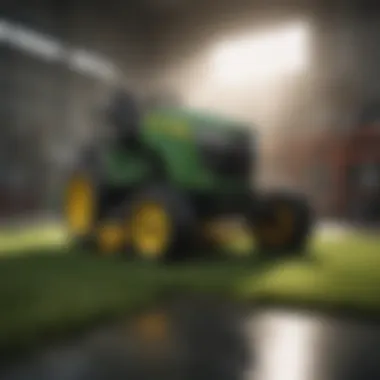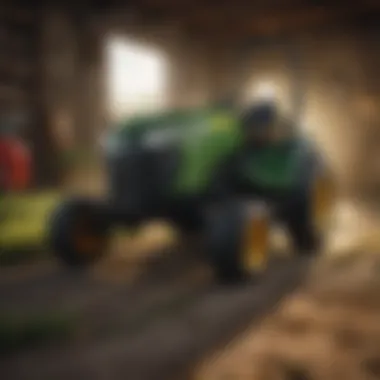Exploring the Manufacturing Roots of John Deere Zero Turn Mowers


Intro
John Deere has been a name synonymous with agricultural innovation for over a century. Among the products that stand out in its extensive lineup is the zero turn mower, a machine that has revolutionized the landscaping and agricultural industries. In this article, we will explore the manufacturing insights behind John Deere’s zero turn mowers, unveiling how these machines are created, where they are made, and the technology integrated within them.
Understanding the origin of these mowers is essential, particularly for those involved in agriculture or landscaping. As the demand for efficient and effective mowing solutions rises, the significance of the manufacturing processes that create these machines becomes even clearer.
Research and Data Analysis
In examining the manufacturing processes at John Deere, we must first understand the broader agricultural landscape. The shift towards advanced machinery, like zero turn mowers, aligns with several current trends in agriculture and horticulture.
Latest Trends in Agriculture and Horticulture
The industry is witnessing a trend toward automation and precision farming. Zero turn mowers fit well into this paradigm as they offer highly efficient maneuverability in both open fields and complex landscaping environments. These machines allow for precise mowing, reducing the time spent on maintenance tasks.
Furthermore, interest in sustainable practices is rising. John Deere’s innovations focus on both performance and environmental friendliness. The company has integrated technology in its mowers that promotes energy efficiency and lowers emissions, aligning with modern agricultural standards.
Statistical Insights into Crop Yields
While zero turn mowers are not directly linked to crop yields, their impact on landscaping can support agriculture indirectly. Well-maintained fields and farms contribute to healthier crops and can ultimately enhance yields. For instance, farms utilizing modern mowing techniques have seen improvements in crop health due to better management of grass and weeds. This relationship underscores the importance of such machinery in the broader context of agricultural productivity.
Best Practices and Techniques
John Deere’s manufacturing facility implements various best practices in production.
Efficient Crop Management Strategies
The production sites prioritize efficiency in their operations. This includes streamlined assembly lines that reduce waste and maximize output. Efficiency not only benefits the company but also ensures timely deliveries to consumers who rely on these mowers for maintaining their landscapes and gardens.
Sustainable Horticultural Techniques
John Deere also emphasizes sustainable production techniques. This includes sourcing materials in a responsible manner and adopting practices that minimize the environmental impact of manufacturing. Such commitments to sustainability resonate with today’s consumers who prioritize eco-friendly products.
Pest and Disease Management
While zero turn mowers themselves do not directly manage pests, proper landscaping and mowing practices can minimize issues in garden and agricultural settings.
Common Pests and Diseases in Crops
It is important to understand the types of pests and diseases plants may face, which indirectly informs effective mowing practices. Regular maintenance of lawns and gardens can prevent many of these issues from becoming severe.
Integrated Pest Management Strategies
Creating a well-managed landscape with the help of zero turn mowers lays the groundwork for integrated pest management. A healthy environment is less susceptible to pest invasions and disease outbreaks. By maintaining the area regularly, the need for chemical treatments can also be minimized, thus promoting a healthier ecosystem.
"Understanding the production journey of John Deere zero turn mowers provides insight into their role in effective landscaping and agriculture."
As we delve deeper into John Deere’s manufacturing practices, we will uncover the intricate details of how these machines are made, the significance of their production locations, and the advanced technology behind their design.
Prolusion to John Deere
John Deere stands as a significant player in the agricultural and landscaping equipment industry. Understanding the brand is crucial, particularly for those interested in the mechanics and innovations of modern machinery such as zero turn mowers. This section provides foundational knowledge on John Deere, exploring its brand reputation, technological advancements, and historical significance.
Overview of the Brand
John Deere was founded in 1837 by a blacksmith named John Deere in Grand Detour, Illinois. The company began with a simple plow designed for the rich soil of the Midwest. Over the years, the brand grew by understanding the needs of farmers and innovating their products to meet these demands. Today, John Deere is synonymous with quality, durability, and innovation in agricultural machinery. Its green and yellow color scheme and deer logo are recognized globally. For farmers and landscapers, choosing John Deere products often means ensuring high efficiency and reliability.


Historical Context
The history of John Deere is intertwined with the evolution of farming practices and technology. In the 19th century, as agriculture became more mechanized, John Deere adapted by expanding its product line, which now includes tractors, harvesters, and mowers. Significant milestones in the company's development include the introduction of the steel plow and the transition into motorized equipment.
The launch of zero turn mowers represents a pivotal moment in John Deere's history, marking their response to the growing need for efficient mowing solutions in both residential and commercial properties. The commitment to innovation dates back over a century and continues to shape landscaping practices today. This historical context is essential for understanding the modern capabilities of John Deere's zero turn mowers and their relevance in current landscaping techniques.
"Understanding the journey of John Deere enriches the knowledge not only of the brand but also of the agricultural practices that shaped it."
In summary, the introduction serves not only to present who John Deere is but also to lay the groundwork for a deeper exploration of zero turn mowers. The brand's evolution reflects broader trends in technology, economy, and agriculture, making it a vital subject for enthusiasts and individuals involved in these sectors.
Understanding Zero Turn Mowers
Zero turn mowers have transformed the way both residential and commercial lawn care is conducted. The importance of this topic lies in the technology and design that characterize these machines, which provide unique advantages over traditional mowers. An examination of zero turn mowers uncovers multiple benefits that cater to various practical needs in landscaping and agriculture.
Defining Zero Turn Technology
Zero turn technology refers to the design of mowers that allow for a very tight turning radius. This is achieved through the use of independent wheel control, enabling each drive wheel to rotate in opposite directions. The design permits these mowers to pivot within their own length. This attribute proves advantageous in navigating landscaped areas with obstacles such as trees, flower beds, and fences.
Furthermore, zero turn mowers often feature powerful engines that support efficient cutting on large expanses of grass, delivering high productivity in terms of area covered in a relatively short time. These machines excel in maneuverability, which can significantly reduce the time and effort needed for lawn maintenance.
Benefits of Using Zero Turn Mowers
The merits of zero turn mowers extend beyond mere convenience. Here are some key advantages:
- Efficiency: The design allows operators to work faster while maintaining precision. The tight turning radius means less time spent on trimming and navigating around obstacles. This efficiency is particularly valuable for commercial landscape maintenance, where time is often critical.
- Quality of Cut: Zero turn mowers are known for providing a clean, consistent cut. Over time, this can lead to improved lawn health, as clean cuts reduce the stress on grass and promote better growth.
- User Comfort: Many modern zero turn mowers come equipped with ergonomic seating and controls, enhancing comfort during extended usage. This aspect is crucial for both casual users and professionals who spend long hours operating such equipment.
- Versatility: With various attachments available, zero turn mowers can be adapted for multiple uses, such as bagging, mulching, and even snow removal in winter months.
"Efficiency and precision are not just goals but essential elements in effective landscaping practices."
Understanding these features and advantages allows users to make informed decisions. As zero turn mowers grow ever more popular in landscaping, recognizing their technology can enlighten potential buyers about their suitability for specific tasks. The impact of these machines is significant, not just in maintenance but in shaping the overall approach to modern land care.
Manufacturing Locations
Manufacturing locations play a critical role in the overall production and success of John Deere zero turn mowers. They contribute to the efficiency, quality, and supply chain dynamics associated with these machines. Understanding these locations allows consumers to appreciate how geographical factors influence production processes and the final product's performance.
Primary Production Facilities
Greenwood, South Carolina
Greenwood, South Carolina serves as an important production facility for John Deere. It is known for its specialized operations in the manufacturing of zero turn mowers. Here, the emphasis is on quality and precision, resulting in products that meet strict industry standards. One key characteristic of Greenwood is its skilled workforce, which brings extensive experience and dedication to the assembly line. The facility also utilizes advanced technologies that enhance manufacturing efficiency.
A unique feature of Greenwood is its integration of local suppliers, which strengthens the supply chain and reduces lead times. This aspect is advantageous as it allows for quick responses to market demands, which can be crucial in meeting consumer expectations. The combination of skilled labor and technological investment positions Greenwood as a beneficial choice in the overall strategy of John Deere.
Horicon, Wisconsin
Horicon, Wisconsin is another vital location for John Deere’s production of zero turn mowers. This facility is recognized for its innovation in manufacturing processes. One distinct characteristic of Horicon is its commitment to sustainability, as it implements eco-friendly practices throughout production. This commitment not only aligns with modern environmental expectations but also enhances the company’s reputation among consumers.
Horicon’s unique feature lies in its focus on engineering advancements. The local engineering teams continuously strive to improve mower designs, ensuring superior performance and durability. Such innovations make Horicon a critical hub within John Deere’s manufacturing network, benefitting both the company and its customers.
Other Notable Locations
In addition to Greenwood and Horicon, John Deere has established other notable manufacturing facilities across the United States. These locations contribute to the diverse production capabilities of the brand. Each site has its specialization, which allows John Deere to diversify its offerings and enhance innovation in zero turn mower manufacturing.
An important aspect of these locations is their ability to respond to regional market needs. They enable the company to cater to different customer segments effectively. This flexibility makes these secondary facilities beneficial by ensuring that John Deere can maintain high standards while also adapting to local demands.
Global Manufacturing Footprint
John Deere’s global manufacturing footprint is expansive and strategically designed to optimize production efficiency. The brand operates in various regions around the world, allowing it to leverage local advantages while remaining competitive in the global market. This geographical distribution supports not only production but also research and development initiatives, resulting in a cycle of continuous improvement.


In understanding the global presence of John Deere, it becomes clear how the company maintains a balance between local needs and international standards. Such a comprehensive approach strengthens the brand’s equity and ensures consumer trust in its products.
Production Process Overview
The production process for John Deere zero turn mowers is crucial in understanding how these machines come to life and why they are esteemed in the industry. This section illuminates various steps that contribute to the efficiency, durability, and reliability of the final product. By optimizing each phase of production, John Deere ensures that its mowers meet the demands of both consumers and professionals.
Material Sourcing and Quality Control
Material sourcing is the bedrock of any manufacturing journey. For John Deere, the path begins with careful selection of high-quality materials. The company relies on trusted suppliers who meet stringent criteria. Steel frames, engine components, and other vital parts are engineered for strength and longevity. Each batch of materials undergoes thorough evaluations to satisfy these requirements. Quality control seeks to minimize defects and enhance performance. To maintain standards, inspectors conduct regular audits at different stages. This diligence assures customers that their zero turn mowers are built to last without compromising on reliability.
Assembly Line Operations
Once materials are acquired, they enter the assembly line operations. Here, skilled workers deploy advanced techniques to construct each mower component. The assembly line is designed for efficiency, allowing for a streamlined workflow. Each part progresses through dedicated stations where workers perform specific tasks. This systematic approach helps in maintaining high production rates without sacrificing quality. Advanced technologies, including robotics and 3D printing, support workers in completing complex assemblies. Every mower is subjected to a sequence of assembly steps that adhere to John Deere's exacting standards.
Testing and Quality Assurance
After assembly, rigorous testing and quality assurance protocols take center stage. Each zero turn mower undergoes multiple rounds of testing before it leaves the production floor. This procedure evaluates everything from engine performance to comfort and usability. Testing not only assesses functionality, but also pinpoint weaknesses that need addressing. Importantly, John Deere utilizes feedback from both the tests and real-world operators to refine their products. Quality assurance acts as a safeguard, ensuring each mower meets the personal expectations of its future owners.
"Quality is not an act, it is a habit."
Understanding these production stages gives insight into how John Deere maintains its leadership in the landscaping market. Every mower produced reflects the company's commitment to excellence, and this thorough scrutiny is what enables them to offer superior products.
Technological Innovations in Manufacturing
Manufacturing process of John Deere zero turn mowers significantly relies on technological innovations. These advancements not only improve product efficiency but also enhance the overall quality. By integrating modern techniques, John Deere continues to set benchmarks in the industry.
Advanced Manufacturing Techniques
Advanced techniques in manufacturing, like computer-aided design and computer numerical control machining, play a crucial role in the creation of John Deere zero turn mowers. CAD allows engineers to design mower components with precision. This leads to lower error rates and improved production timelines. Machining processes powered by CNC machines ensure that every part meets stringent specifications, enhancing the durability and reliability of each mower.
Additionally, just-in-time production has been adopted at many facilities. This technique minimizes waste and ensures that parts arrive exactly when needed. The efficiency of this method not only cuts costs but also improves the flexibility of the manufacturing process, allowing quick adaptation to changing market demands.
Role of Automation
Automation is another vital element in the manufacturing of zero turn mowers. Robotics play an important part in assembly lines. These machines can perform repetitive tasks quickly and with high precision, which reduces the chances of human error. This not only speeds up production but also increases the consistency of the final product.
Moreover, automated systems can gather data throughout the entire manufacturing process. Analyzing this data helps in identifying potential issues before they escalate. This proactive approach leads to better maintenance of machinery and a smoother production flow.
"Innovations in manufacturing processes lead to enhanced product reliability and operational efficiency."
In summary, technological innovations in manufacturing are not merely advantageous for John Deere. They represent a fundamental shift in how mowers are designed and produced, contributing to customer satisfaction and long-term investment in the equipment.
Implications for Consumers
The production and innovation of John Deere zero turn mowers carry significant implications for consumers. Understanding these implications can enhance the buying decision process for potential users, whether in residential or commercial settings. The combination of quality, performance, and cost is crucial for achieving optimal value from these machines.
Understanding Quality and Performance
John Deere's commitment to quality is evident in the rigorous standards imposed at every stage of manufacturing. Quality assurance practices ensure that every component meets specific performance criteria. This attention to detail results in mowers that excel in efficiency and durability. Consumers gain peace of mind knowing their equipment is built to withstand the demands of varied tasks.
Several factors contribute to overall performance:
- Engine Power: The mowers are equipped with robust engines that provide ample power for challenging tasks.
- Maneuverability: The zero turn technology allows operators to navigate tight spots effectively, enhancing productivity.
- Cutting Quality: The design of the cutting decks ensures a clean and precise cut, vital for well-manicured lawns.
Understanding these features helps consumers select a mower that suits their needs precisely. Performance ratings and user feedback can also offer guidance, allowing potential buyers to make informed choices.
Price vs. Quality Considerations


The relationship between price and quality is often complex but highly relevant to consumers contemplating a John Deere zero turn mower. While upfront costs may seem high compared to other brands, the long-term value often justifies the investment. Here are some considerations regarding price versus quality:
- Longevity: Higher-quality mowers typically offer greater longevity, reducing the need for frequent replacements.
- Reduced Maintenance: Increased durability leads to fewer repairs and part replacements over time.
- Resale Value: John Deere products often retain value better than generic counterparts, making them a wise purchase for the future.
When evaluating price, consumers should consider the total cost of ownership. This includes maintenance, fuel, and potential resale value over time.
"Investing in quality machinery often pays off in reduced operational costs and increased productivity for homeowners and landscapers alike."
In summary, understanding the implications of quality and cost will enable consumers to make well-informed decisions regarding John Deere zero turn mowers. Their advanced technology and durable construction promise a reliable and efficient mowing experience.
Local Economic Impact
The manufacturing of John Deere zero turn mowers plays a critical role in the economy of the regions where production sites are located. It not only supports employment but also stimulates the local economy through various channels. Exploring these impacts helps understand the broader significance of such manufacturing activities beyond just producing equipment for landscaping and agriculture.
Job Creation in Manufacturing Regions
Initiating production facilities in areas such as Greenwood, South Carolina, and Horicon, Wisconsin, has resulted in significant job creation. These plants hire a diverse workforce, ranging from engineers and quality control specialists to assembly line workers and administrative staff. The presence of John Deere increases the demand for skilled labor, thereby encouraging educational institutions to develop programs aimed at training individuals for these roles.
- Direct Employment: Thousands of jobs created directly in manufacturing plants.
- Indirect Employment: Additional jobs in transportation, logistics, and retail due to increased demand.
- Skill Development: Opportunities for local residents to gain valuable skills in advanced manufacturing technologies.
By providing stable employment, the company contributes to improved living standards for many families in the localities. The multiplier effect of such employment cannot be ignored; as workers earn wages, they spend money in local shops, schools, and services.
Impact on Local Suppliers
The presence of John Deere also has substantial implications for local suppliers. These suppliers provide essential components, raw materials, and services, creating a chain reaction of economic activity within the region.
- Component Suppliers: Local companies that manufacture parts like engines, wheels, and cutting decks often benefit significantly.
- Service Providers: Businesses such as maintenance, cleaning services, and logistics receive steady contracts from the manufacturing plants.
- Supplier Innovation: The demand for high-quality parts forces local suppliers to innovate, improving their processes and products, which positively affects their growth and competitiveness.
The integration of local suppliers in the supply chain results in reduced transportation costs and shorter lead times, ultimately enhancing John Deere's operational efficiency. By fostering these local relationships, John Deere not only reinforces its manufacturing capabilities but also strengthens the entire regional economy.
"The economic ripple effects of manufacturing lead down the line to local schools, businesses, and hospitals, enriching the community as a whole."
This interplay showcases how a large corporation like John Deere can have a lasting influence on its surrounding community, making it vital in considerations related to local economic impact.
Sustainability Practices
Sustainability practices are crucial for any modern manufacturing operation, especially for a prominent brand like John Deere. These practices not only address environmental concerns but also play a significant role in corporate social responsibility. For John Deere, implementing sustainability approaches in the manufacturing of zero turn mowers aligns with global trends and regulatory requirements while enhancing brand reputation. The key elements to consider include environmental impact, resource management, and community engagement.
Environmental Considerations in Manufacturing
John Deere considers the environmental ramifications of its manufacturing processes. Reducing waste, conserving water, and lowering emissions are paramount. Recycling initiatives aim to minimize landfill contributions. For instance, the use of recyclable materials in mower production reduces reliance on virgin resources.
Additionally, energy-efficient machinery is essential. Enhancing machinery to consume less energy contributes not only to cost reduction but also to lowering the carbon footprint. The integration of renewable energy sources such as solar panels in production plants exemplifies this commitment. Moreover, stringent protocols for managing hazardous substances are in place to ensure worker safety and environmental protection.
"Embracing sustainable practices in manufacturing is not just an ethical choice. It's a strategic decision that influences the long-term viability of products and the brand itself."
Long-term Sustainability Goals
Long-term sustainability goals for John Deere in the context of zero turn mowers emphasize the importance of continuous improvement. These goals are not static; they evolve as new technologies emerge and societal priorities shift.
One clear aspect is the commitment to improving product longevity. By designing mowers that are durable and easily repairable, John Deere supports a circular economy. This approach encourages customers to invest in maintenance instead of frequent replacement.
Furthermore, John Deere has set measurable targets such as reducing greenhouse gas emissions by a specified percentage within a defined timeframe. By emphasizing transparency and accountability, the company can foster trust among stakeholders.
End
The examination of John Deere's zero turn mowers reveals not just a product, but an evolution in design and technology that reflects significant advances in the manufacturing sector. Understanding the manufacturing processes and locations sheds light on how these machines meet the diverse needs of both commercial landscaping and personal garden care. The precision in production techniques ensures that the equipment is reliable, making it easier for users to achieve professional results.
Summary of Key Points
Several crucial points emerge from this discussion. First, the geographical distribution of John Deere's manufacturing facilities plays a fundamental role in ensuring that quality control is maintained across all production stages. Each site, from Greenwood to Horicon, contributes to bringing a high standard of engineering to the final product. Second, the integration of technological advancements helps optimize the assembly line process. Automation not only increases efficiency but also enhances precision, leading to superior mower performance. Finally, the sustainability practices embraced by John Deere signify a conscientious approach to production, addressing environmental concerns while meeting market demands.
"Understanding the origins of John Deere zero turn mowers offers insights into their substantial role in enhancing the productivity of landscaping activities."
Future Outlook for John Deere Zero Turn Mowers
As we look ahead, the future of John Deere zero turn mowers appears promising. With the ongoing evolution of technology, including the integration of IoT capabilities for smarter mowers, users can expect enhanced functionality. This can lead to improved fuel efficiency, increased lifespan of the mowers, and better overall user experience. Moreover, with a growing emphasis on sustainability, John Deere will likely continue to implement eco-friendly practices in its manufacturing processes. The future also hints at broader market accessibility, as the company might expand its offerings to cater to diverse user needs, thereby further solidifying its position in both professional and residential landscaping markets.















